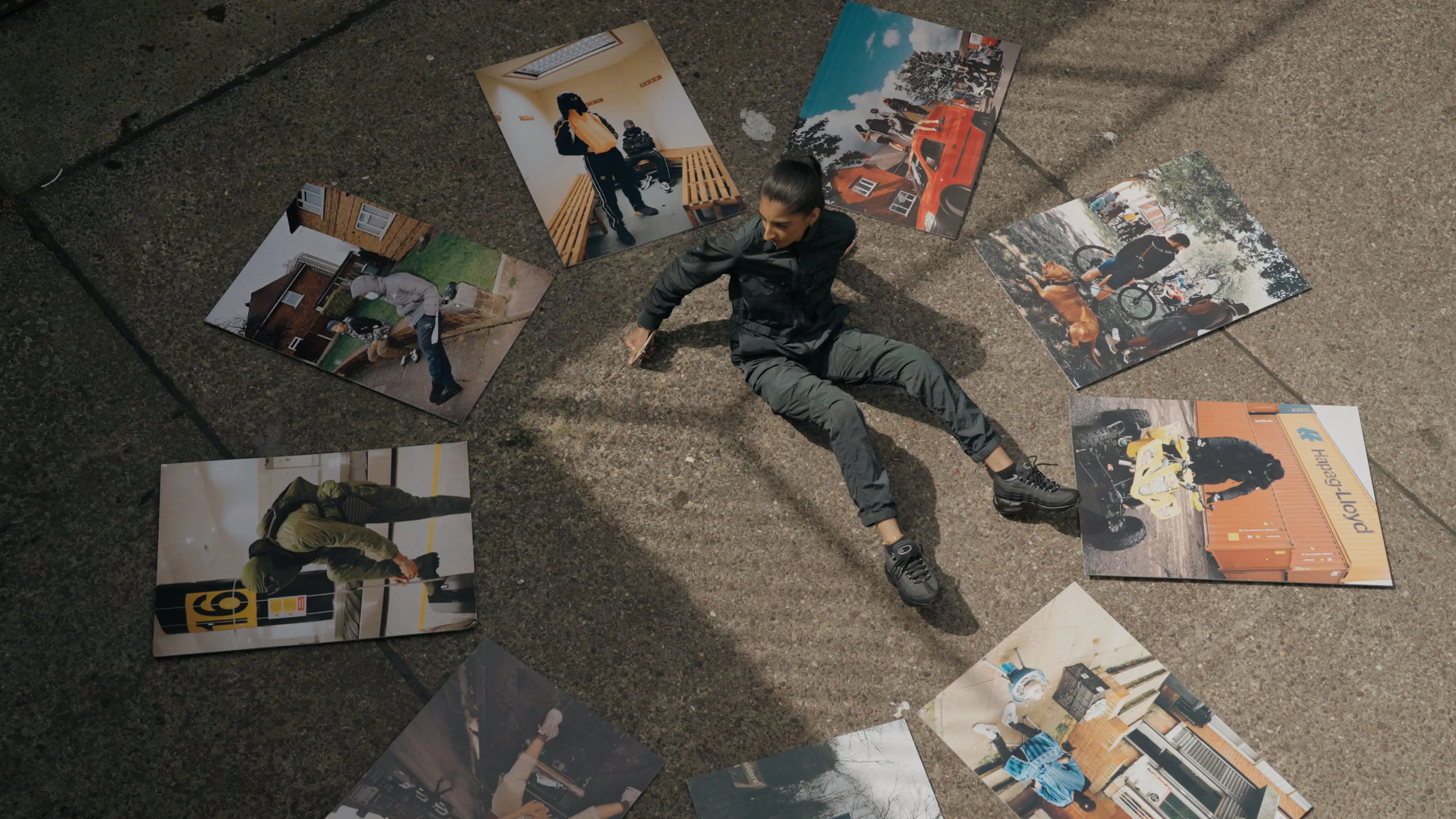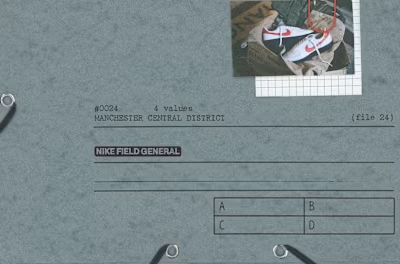Sportswear is Alina Akbar’s Attire; Authenticity is Her Artform

While authenticity is not always relatable, it is often respectable; liberating; refreshing. Thus, for filmmaker, photographer and visual artist Alina Akbar, autobiographical storytelling is not only a personal encounter, but a celebration of the bonds in her diaspora, with cultural reflection her spoken mother tongue. Spanning cerebral, white-walled curations to home-grown documentaries, her intersectional approaches hold a mirror to the true Northwest, with her feet planted in intergenerational soil and hands softened with Asiatic heritage.
Where narratives in honour of Manchester’s South Asian community were once scarce, Akbar projects them to be seen without filter. “Everyone sees it as this community-focused work,” she offers offhandedly, “but I just see it as my day-to-day life”. Replacing gallery glamourisation and museum biases with raw footage of domesticity and joy, she pans the focus over ancestorial chapters and the fringes of northern identity – shared by many but told by few.
Moreover, for the auteur, dressing in designer garments from the likes of Stone Island and C.P. Company – badged with their own cultural ties to the working-class through the football Casuals scene – then spurs not an escaping of her grounded roots, but a chance to parade her self-made identity, fragmented in part by fashion, culture, heritage, and faith.
As she takes agency in directing her cherished stomping ground in an exclusive film for SEVENSTORE, titled Lean Street Hooligans, her starring radiates from an elevated uniform. In conversation with prime stylistic influences: her mother, best friend Viss, and C.P. Company president, Lorenzo Osti, the feature is textured with fabric sublimations from Osti’s governing brand and layered further with the tokens of Akbar’s cultural belongings. The foothills of the south Pennines lay backdrop to stories untold as we resign into our own discussions – beside the sartorial – of familial ties and ethical practice, noting the impact of each project she has helmed in her young tapestry.
Raised in Rochdale by a fourth-generation Pakistani household, the 24-year-old’s social awareness first flourished organically, nurtured by the presence of her bloodline. “Our great grandparents came to England to work in the factories that you see dotted around. So, from the jump, the town has a strong Northwest identity,” she reflects. And whilst evolving from the seeds sewn in her streets was pivotal for Akbar and her visual identity, it stands a foreign concept to those who didn’t sprout from such backgrounds. “You get to see what they built from what they had,” she praises.
For modest youth, creative flair can surface within domesticity and the seemingly mundane, as was apparent within Alina’s upbringing. “Speaking to my mum, she’d say I’ve always had a different appreciation for things; always been intuitive,” she recounts. At an early age, where social media created an accessible path for experimentation, Alina found her fervour for grainy visuals through moguls emerging from similar backgrounds. “I never had a personal Instagram; it was always posting things I liked: film photography, grime sets. And now I see those parallels in my work,” she reveals, referencing the square boxes that now frame her own accomplished campaigns and candid snapshots.
Pared back by self-awareness but propelled by gratitude, Alina’s motivation today stems from her fate in comparison to others. “It’s a privilege,” she proclaims of her unremitting freelance career. “Women are oppressed who come from the same background as me; I don’t abuse that position”. So, as a Brown woman now in her in adulthood, while adversities may appear visible, she finds opportunities to educate and be thankful, living out her truth. “I appreciate sitting in the sun, eating and just being human, because it’s that being human that informs my work”.
With the unveiling of the refurbished Manchester Museum in 2023, Alina occupied the space with “Indian nursery rhymes mixed into drill beats” for a vibrant 3-channel film named ‘Pardesi Raga’. Cutting the figurative ribbon on a space dedicated to interracial stories, the project permitted a more relatable insight into the city’s peripheries, flourishing “from corner shops and curry houses”. But with the director of the British Museum envisioning her piece as “the future of museums”, Alina refuses to settle into victory. Describing this highbrow exposure of her lived experiences as “contemporary”, Alina remains level-headed in knowing her community will continue to thrive, with or without an audience, as it has for centuries.
In addition, Alina’s influence has given rise to a rupture in the gallery system. By inviting new faces to see and be seen, she breaks down its structure and pieces it back together. “It’s funny because I’m not experienced in those spaces. I’m just as excited as the public”. But an ultimatum arises as to whether these elitist locations will ever be home to her community, or whether they have any desire to make them so. “I show my friends ‘look what I did today’, because there’s not always stories for us in those environments. If my work is shown there, it doesn’t mean it’s better. I’m trying to make sure those who use Instagram as a resource have that audience too,” she notes, arising that it’s a privilege to put a phone away in a space built for the few.
Opening the floor for all to contribute, Akbar’s method is a mastering of ethics, but one she assures is without conscious effort. “There’s a nice experience in working with your community. You know how to treat them,” she expresses, softening the sharp gaze of her lens with a point of familiarity to reach for. “I might end up in a youth club or a conversation with my grandparents,” she lists, triggering thought: “is it meaningful? Or is it just the way I portray it?’” Consequently, a further theory surfaces. Is Alina saying something heroic, or merely opening a conversation that nobody pushed to vocalise – one previously falling on deaf ears?
Evidently, Alina’s résumé is concretised in community betterment, representing the interracial northwest through introspective verses and unyoking moving imagery. But her clothes, instead, serve an ounce of independence. Finding partitions from classist constructs, she admits, “when you come from these backgrounds, people don’t understand why you want nice things”, before countering that “these styles come from us, so why shouldn’t we wear them?” Assigning her apparel choices and golden accessories to extensions of her being, her style proves a reclamation of material enjoyment. “Who said fashion’s reserved for the middle class, especially streetwear?”
Now holding a bond with a name circulating the cornerstones of Italian sportswear, interviewing C.P. Company president Lorenzo Osti for her latest film with SEVENSTORE – a relationship started when she appeared in the brand’s AW22 campaign with her dad – the piece proves full circle since admiring her father’s C.P. pieces in childhood. Supporting her vision ever since, Osti is a case-in-point for Alina’s levitation toward not just emboldened streetwear, but genuineness. “He likes to learn about the people who wear, collect, and build a lifestyle around C.P.” she prides, amplifying parallels. Interspersed with references of sport, the northwest and the working-class, the outfitter pits just one of Akbar’s stylistic layers today. “The meanings of clothes hold more of a reason for me to display them”, she concludes.
Evidently, living with purpose is ingrained. “We’ve already won by being born in the West,” the artist stresses. “So, the least I can do is be authentic”. And on being asked if she would consider documenting stories outside of her Northern hometown, it appears to have been picked with some thought. “I have things to fulfil here,” she arises, “not necessarily creatively, but for my family. When you have that bond, I’m not chasing community elsewhere. Finding rich experiences, that’s the goal”.
Taking life from the source, Alina is unaffected by fiction, fable, or experiences watered down by hearsay. Hence, with no strive to turn away from those that came before her, she places power in the palms of those who will follow after. With an appreciation of her efforts visible not only in her immediate tribe, but in northernmost spaces and relations overseas, personal pride embellishes her wardrobe. Without question, Alina’s authenticity is an artform.
Like this project
Posted Jul 7, 2024
From my initial content pitch, I executed an impactful, cultural feature on Northwest artist, Alina Akbar, comprising interviewing and film caption writing.





